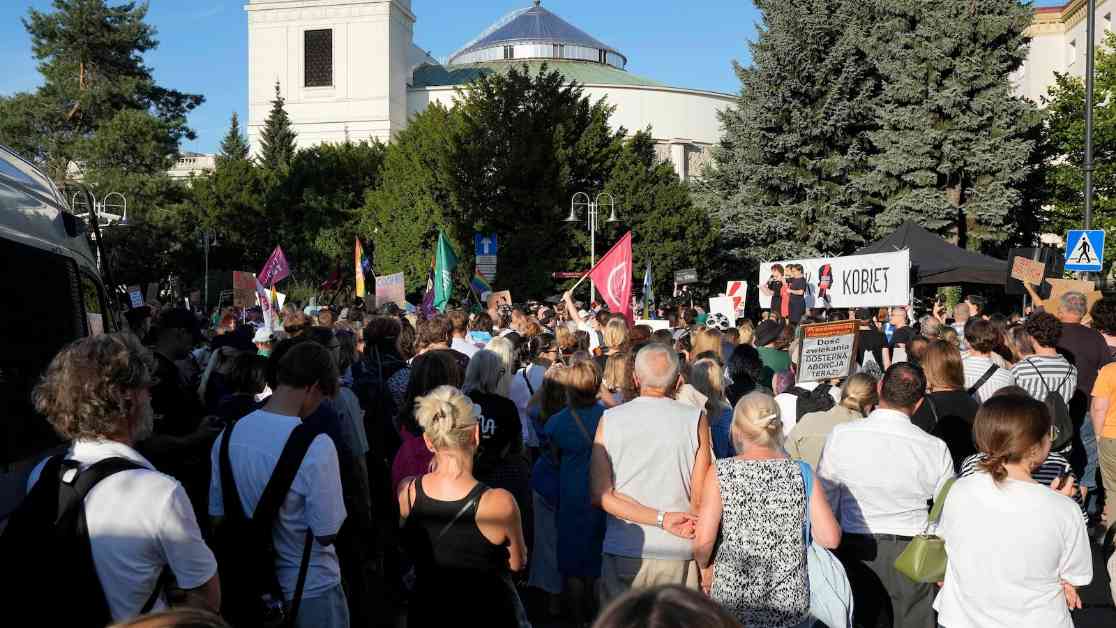Polish Parliament Struggles to Change Abortion Law, Says Prime Minister Tusk
In a recent statement, Polish Prime Minister Donald Tusk admitted that he lacks the necessary support in parliament to reform the country’s strict abortion law. Poland currently has one of the most restrictive abortion laws in Europe, allowing the procedure only in cases of rape, incest, or when the woman’s life or health is at risk. Tusk, a centrist leader who came to power in December, had promised during his campaign to liberalize the abortion law to permit abortions up to the 12th week of pregnancy. However, the deeply divided parliament, with lawmakers on both the left and right, has made it challenging to push through any significant changes.
Tusk acknowledged the reality of the situation during an event on Friday, stating, “There will be no majority in this parliament for legal abortion, in the full sense of the word, until the next elections. Let’s not kid ourselves.” With lawmakers serving a four-year term after being elected last October, Tusk emphasized that his government is focusing on implementing new procedures within the prosecutor’s office and Polish hospitals to alleviate some of the practical barriers faced by women seeking abortions.
Poland’s Complex Societal Landscape
Poland, a predominantly Roman Catholic country, has a deeply ingrained religious influence that shapes its societal norms and values. However, the nation is also experiencing a rapid process of secularization, driven by economic growth and modernization. The issue of abortion has become a significant point of contention, reflecting the broader social and political divisions within the country. While the Catholic Church wields considerable power and influence, there is a growing segment of the population that advocates for more liberal laws regarding reproductive rights.
The recent tightening of restrictions on abortion under the previous conservative government triggered widespread protests across Poland, with demonstrators voicing their opposition to the erosion of women’s rights. The removal of the provision allowing abortions in cases of fetal deformities sparked outrage and highlighted the ongoing struggle between traditional values and progressive ideals within Polish society. As a result, the debate over abortion has become a focal point for political activism and advocacy efforts.
Challenges Faced by Women Seeking Abortion
Despite the existing legal framework that permits abortion in limited circumstances, many women in Poland encounter significant obstacles when trying to access reproductive healthcare services. Reports have surfaced of pregnant women being denied abortions even in cases where it is legally permissible, leading to tragic consequences in some instances. The prioritization of fetal well-being over maternal health in medical settings has raised concerns about the lack of comprehensive reproductive rights for women in Poland.
Moreover, the stigma surrounding abortion and the complex legal procedures involved in obtaining permission for the procedure have deterred many women from seeking necessary healthcare services. In cases of rape or incest, the requirement to report the crime to the prosecutor’s office and obtain court approval adds another layer of complexity to an already challenging situation. Activists and advocates in the field of reproductive rights have highlighted the need for a more compassionate and supportive approach to address the needs of women facing unplanned pregnancies.
Implications for Women’s Health and Rights
The restrictive abortion laws in Poland not only limit women’s autonomy over their bodies but also have serious implications for their health and well-being. The lack of access to safe and legal abortion services drives many women to seek alternative, often risky methods to terminate pregnancies, such as using abortion pills obtained from overseas or traveling to other countries where the procedure is more accessible. This puts women at risk of harm and exposes them to potential legal repercussions for seeking reproductive healthcare outside the country.
Furthermore, the criminalization of individuals who assist women in obtaining abortions creates a climate of fear and uncertainty for healthcare providers and activists working in the field of reproductive rights. The case of an activist being convicted for providing abortion pills to a woman underscores the punitive measures faced by those who support women’s reproductive choices. The need for a more compassionate and rights-based approach to abortion is evident in light of the challenges and barriers faced by women seeking to exercise their reproductive rights in Poland.
In conclusion, the ongoing debate surrounding abortion in Poland reflects the complex interplay of religious, social, and political factors shaping the country’s approach to reproductive rights. While Prime Minister Tusk’s acknowledgment of the lack of parliamentary support for liberalizing the abortion law is a setback for advocates of reproductive rights, the continued activism and advocacy efforts of civil society organizations are crucial in pushing for progressive change. As Poland grapples with the tension between traditional values and evolving societal norms, the need for a more inclusive and rights-based approach to reproductive healthcare remains a pressing issue for women’s health and rights in the country.


















